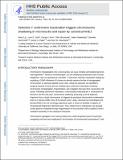Selective Y centromere inactivation triggers chromosome shattering in micronuclei and repair by non-homologous end joining
Author(s)
Ly, Peter; Kim, Dong H.; Shoshani, Ofer; Skaletsky, Helen; Fachinetti, Daniele; Cleveland, Don W.; Teitz, Levi Shmuel; Page, David C; ... Show more Show less
Downloadnihms886286(1).pdf (993.1Kb)
PUBLISHER_POLICY
Publisher Policy
Article is made available in accordance with the publisher's policy and may be subject to US copyright law. Please refer to the publisher's site for terms of use.
Terms of use
Metadata
Show full item recordAbstract
Chromosome missegregation into a micronucleus can cause complex and localized genomic rearrangements known as chromothripsis, but the underlying mechanisms remain unresolved. Here we developed an inducible Y centromere-selective inactivation strategy by exploiting a CENP-A/histone H3 chimaera to directly examine the fate of missegregated chromosomes in otherwise diploid human cells. Using this approach, we identified a temporal cascade of events that are initiated following centromere inactivation involving chromosome missegregation, fragmentation, and re-ligation that span three consecutive cell cycles. Following centromere inactivation, a micronucleus harbouring the Y chromosome is formed in the first cell cycle. Chromosome shattering, producing up to 53 dispersed fragments from a single chromosome, is triggered by premature micronuclear condensation prior to or during mitotic entry of the second cycle. Lastly, canonical non-homologous end joining (NHEJ), but not homology-dependent repair, is shown to facilitate re-ligation of chromosomal fragments in the third cycle. Thus, initial errors in cell division can provoke further genomic instability through fragmentation of micronuclear DNAs coupled to NHEJ-mediated reassembly in the subsequent interphase.
Date issued
2016-12Department
Massachusetts Institute of Technology. Department of BiologyJournal
Nature Cell Biology
Publisher
Springer Nature
Citation
Ly, Peter et al. “Selective Y Centromere Inactivation Triggers Chromosome Shattering in Micronuclei and Repair by Non-Homologous End Joining.” Nature Cell Biology 19, 1 (December 2016): 68–75
Version: Author's final manuscript
ISSN
1465-7392
1476-4679